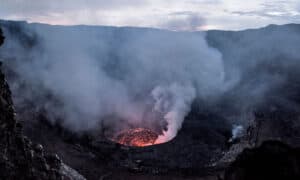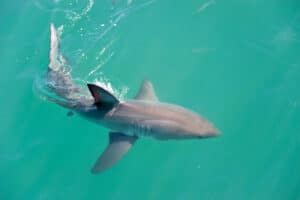Great white sharks are perhaps the most famous fish swimming in our oceans. They evoke fear in many, awe in some, and curiosity in others. Great whites can get up to twenty feet long and weigh as much as 5,000 pounds.
They are unique among fish in that they keep their blood flowing warmer than the ocean waters around them. Almost no other large fish swims faster than a great white on the hunt. All of this begs the question; just what powers the great white?
Here, we’ll discover what great white sharks eat, how they hunt, and why so many people fear them. We’ll learn why no great whites exist in captivity, and finally, we’ll learn just where baby great whites come from.
What Do Great White Sharks Like to Eat?
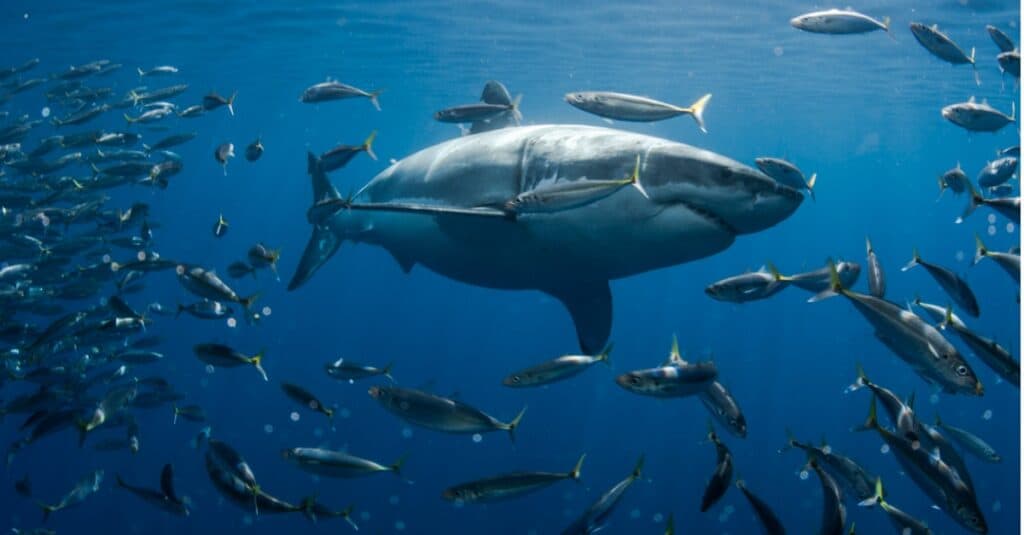
Great white sharks eat seals, sea lions,
dolphins
, and fish, among other animals. They are carnivores
©iStock.com/atese
Great white sharks eat mostly pinnipeds like seals and sea lions. They are carnivores, their diet consists entirely of meat.
Great whites are opportunistic, generalist hunters. This means their diet is far reaching, and they don’t say no to an easy meal. They are epipelagic fish, which means they live in the most shallow layer of the ocean. Great whites tend to congregate wherever large populations of seals abound. Though seals are their favorite food, they will also eat:
- Pinnipeds: Seals, sea lions, northern elephant seals, brown fur seals, harbor seals, California sea lions, and grey seals
- Cetaceans: Dusky dolphins, Risso’s dolphins, bottlenose dolphins, humpback dolphins, harbor porpoises, Dall’s porpoises, beaked whales, and Cuvier’s beaked whales
- Fish: tuna, mackerel, oceanic sunfish
- Seabirds
Great white sharks are apex predators, and need a lot of food to fuel their big bodies. They have even been observed scavenging carrion meat from whale carcasses. They have also been known to attack and kill young or sick humpback whales. Great whites have been found in every major ocean in the world. Though they have no natural predators, humans are their biggest threat.
How Do Great White Sharks Hunt?
Great whites are excellent hunters. They first detect their prey using specialized ampullae of Lorenzini organs. These organs enable the shark to sense the electromagnetic fields emitted by creatures moving around in the water.
Once the great white has sensed a suitable target, they ambush it, swimming towards it at lightning speed, often from below. The shark bites before the prey knows what’s hit it. Most often, the great white lands one catastrophic bite to the target’s body, then it swims off and waits for the prey to bleed out or drown, at which point the shark can eat at its leisure.
Great whites do not chew their food. Instead, if they can’t swallow the whole thing in one bite, they bite the creature, then whip their head back and forth. The great white’s teeth are serrated, and as they jerk their head, the teeth saw off a chunk of flesh. The shark does this, swallowing the chunks whole, until it’s had its fill.
Captive Great White Sharks
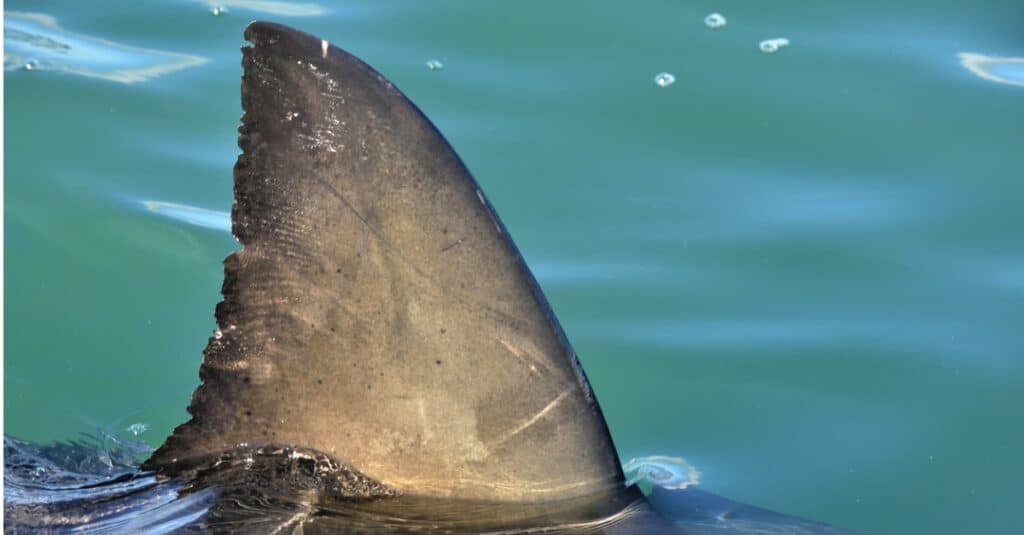
Great white sharks are generalist hunters, which means they eat a wide variety of prey items
©iStock.com/USO
There are currently no captive great white sharks anywhere in the world. But, why is this? It should be easy to place a great white in an aquarium, then feed it already dead fish, right?
Wrong. Great white sharks are one of the only fish that cannot survive in aquariums. This is for a couple of reasons. First, great whites swim more than 10,000 miles a year on their migratory routes. Scientists aren’t sure why, but great whites that can’t make these journeys don’t live long. Second, and perhaps most important; great white sharks need a tremendous amount of food every day, and fish just won’t cut it.
Great white sharks need foods that are high in fat and low in bones, like seals and sea lions, to survive. Unfortunately aquariums are not equipped to provide great whites with either the room they need, or the fresh supply of live seals.
Why Do Great White Sharks Attack Humans?
Great white sharks have incredible movement sensing abilities, but their vision is not too great. Scientists think this has something to do with why they sometimes attack humans. Most often, when a great white attacks a person, they back off after the first bite. Scientists theorize that great whites can tell that people are not good eating (too bony) until after they’ve bitten them, but they can’t be certain why these massive sharks so often leave after the first bite.
Little is known about great white sharks, but the fact that they are the apex predators of coastal waters means that they will, occasionally, come into contact with humans. Though, your chances of being attacked by a great white shark are actually less than your chances of being struck by lightning even if they are the most aggressive shark in the world.
What Great White Shark Pups Eat?
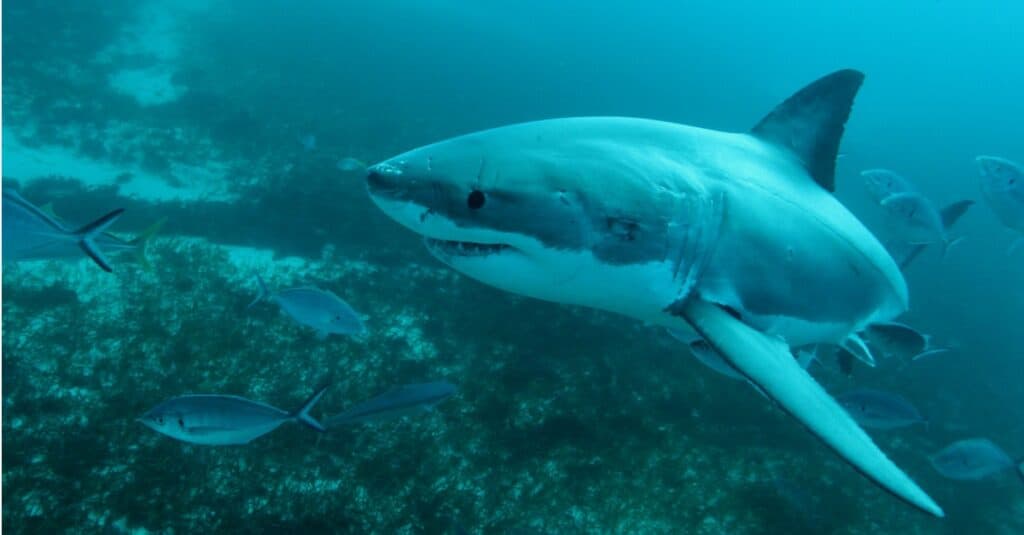
Great white shark pups eat lobster and crab, as well as smaller fish and other sharks
©iStock.com/Alessandro De Maddalena
Great whites are ovoviviparous, which means that, while they do have eggs, the females actually incubate the eggs inside their bodies. The eggs even hatch inside the womb. From there the baby sharks, called ‘pups’ gestate for 11 months before the mother births them. Pups have been known to eat unhatched eggs, and even their fellow pups, while still in the womb.
Great white shark pups are over three feet long at birth. They immediately begin hunting, though seals and sea lions won’t be in their diet until they get closer to ten feet long. Great white shark pups eat mostly fish, crabs, lobster, and smaller sharks.
The photo featured at the top of this post is © iStock.com/Alessandro De Maddalena
Thank you for reading! Have some feedback for us? Contact the AZ Animals editorial team.





